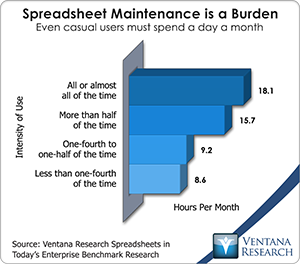The spreadsheet is one of the five most important advances in business management over the last 50 years. It has changed all aspects of running an organization. It was the original “killer app” that made people go out and buy personal computers. So you see I’m enthusiastic about spreadsheets, but I realize they have limits that must be respected to  work efficiently. One of the more important findings from our benchmark research Spreadsheets for Today’s Enterprise was about the time spent in maintaining spreadsheets. We asked participants how much time they spend per month in updating, revising, consolidating, modifying and correcting the spreadsheet used in the most important process associated with their job. The answers varied depending on the intensity with which people work with spreadsheets. On average, the heaviest users – those whose work requires them to spend all or almost all of their time using them – spend 18.1 hours per month on maintenance – the equivalent of more than two days per month! Even those who spend more than half their time in this fashion use up nearly two days (15.7 hours). For a tool designed to enhance personal productivity, these results should be sobering to executives and managers.
work efficiently. One of the more important findings from our benchmark research Spreadsheets for Today’s Enterprise was about the time spent in maintaining spreadsheets. We asked participants how much time they spend per month in updating, revising, consolidating, modifying and correcting the spreadsheet used in the most important process associated with their job. The answers varied depending on the intensity with which people work with spreadsheets. On average, the heaviest users – those whose work requires them to spend all or almost all of their time using them – spend 18.1 hours per month on maintenance – the equivalent of more than two days per month! Even those who spend more than half their time in this fashion use up nearly two days (15.7 hours). For a tool designed to enhance personal productivity, these results should be sobering to executives and managers.
The heart of the problem is the comfort factor. People are so familiar with and in many cases so adept at using spreadsheets that they overlook or minimize their inherent problems. Spreadsheets make it easy for individuals with no IT skills to translate their ideas into analytic business models, capture data and create reports with that information. For experienced users, they are easy to design and set up. Many find them preferable to more formal methods used by the IT department or another third party. Spreadsheets give users autonomy. Indeed, a majority (56%) of our research participants said it takes too long or far too long for their IT department to create or modify a report.
That’s the upside. Problems arise when spreadsheets are used in collaborative, repetitive processes. Desktop spreadsheets are error-prone and have cost companies billions of dollars. One problem is that they bog down quickly. Our finding about time spent in maintaining spreadsheets illustrates another major defect with spreadsheets: The time saved in setting them up is more than offset by the time spent using and taking care of them.
Our research and experience have identified several factors that cause people to underestimate the negative impacts of spreadsheets on productivity. Generally, while the consequences of problems with spreadsheets can be various and persistent, they are rarely catastrophic and infrequently serious. Thus, while people may be aware that they are losing time, each loss is a small one and may be forgotten soon. Moreover, people (especially heavy and/or long-experienced users of spreadsheets) who have adapted their work styles to deal with these issues may not view this chore as interrupting productive work. People used to dealing with spreadsheet hassles also may think that their job includes fixing such problems. As well, senior executives and decision-makers are not likely to be concerned by the increments of time in which spreadsheets occupy people, especially since those whose careers go back to the beginning of spreadsheets still perceive them as productivity enhancers relative to paper-based systems. In other words, people are in denial about the issues they face daily when they misuse desktop spreadsheets.
Today, companies have more options than ever before to embrace and extend spreadsheets – to have the best of both worlds. There is a variety of new, affordable software to complement spreadsheets and address their shortcomings. Many applications use Excel as their interface – giving users the same familiar look and feel – while addressing key technological shortcomings of desktop spreadsheets that make them error-prone and difficult to consolidate or roll up. In short, there are many ways to make a core business process function better by replacing desktop spreadsheets with tools better suited to the task. Not all of these products are provided by large vendors, so you may have to find them yourself.
The next time you find yourself debugging a spreadsheet, dealing with maintenance issues or trying to find the source of some error in one, consider that there is a better way that doesn’t necessarily mean migrating to software that requires ongoing IT involvement. Take a look at the large assortment of spreadsheet replacements on the market; you should be able to find one that solves your problem.
Regards,
Robert Kugel – SVP Research











